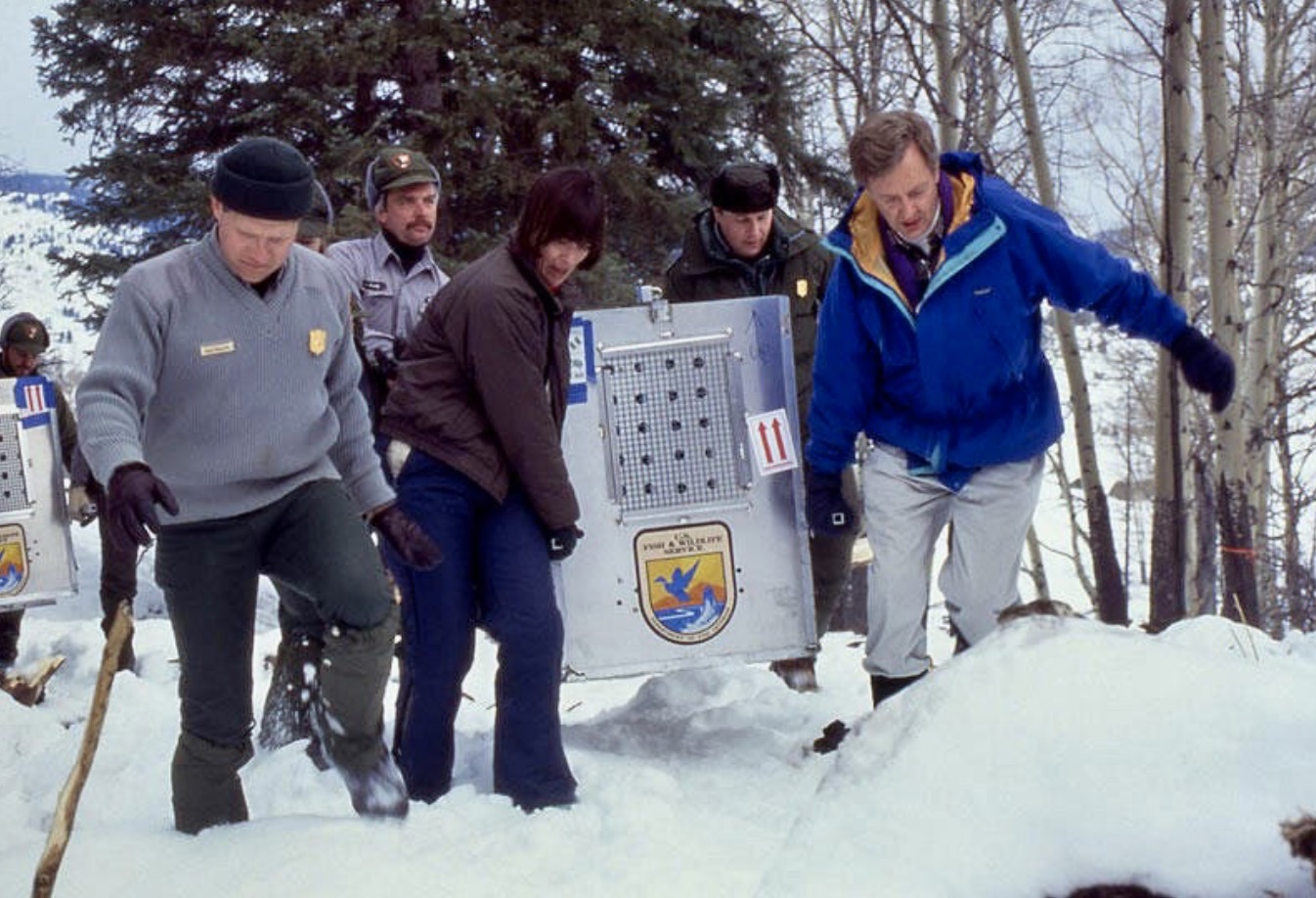By Todd Wilkinson EBS Environmental Columnist
Up in the Far U.S. North, he spent months studying grizzlies on the tundra, sleeping in a tent on nights when the summer sun barely dipped below the horizon. On the other side of the thin wall of polyester, he could hear massive brown bears walking close—the shadows they cast so near he smelled their breath.
As part of his own curiosity, he studied 200 wolf skulls, discovering that a high percentage had broken jaws with missing teeth or cranium cracks where moose hooves had delivered concussive blows to lobos. “It’s not easy making a living with your mouth,” he says.
In northern Minnesota he would be out all night, driving a 100-mile route on backroads, stopping along the way to howl, listening for replies as a way of conducting a wolf census. Later, he would lead the return of imperiled species to ranch lands owned by Ted Turner.
His most famous contribution was being handpicked to carry out the historic reintroduction of 31 gray wolves in the mid 1990s to Yellowstone National Park, where they ironically had been exterminated.
These are just a few of the experiences that serve as mileposts in a career Mike Phillips reflects upon as having three very different yet interwoven parts: that of field scientist grinding out research day by day on public land; helping to write a new chapter for wildlife conservation on private land, proving that saving imperiled species need not be a major burden for property owners; and then having a lengthy stint as an elected public official in the Montana Legislature.
In July, Phillips was informed that he would receive the Aldo Leopold Memorial Award, the top honor bestowed by The Wildlife Society, one of the most respected professional organizations in the realm of wildlife science.
In addition to Phillips’ field assignments in the Southeast and Yellowstone, he was an advisor in emphasizing the real natural history of wolves before Coloradans went to the polls in 2020 and passed a resolution that compelled the state game agency to restore wolves there in 2023. He also, this spring, helped orchestrate Mexican gray wolves being released on Ted Turner’s Ladder Ranch in New Mexico.
Not long ago, I had a chat with Phillips.
TODD WILKINSON: The sum of your career has been, in many ways, a series of predictable and unpredictable meanderings through the ideals spelled out by Leopold in “A Sand County Almanac” and other writings and talks he gave. Why do you take heart in receiving the Leopold award?
MIKE PHILLIPS: Because the award stands as testimony to a professional life—Leopold’s— well led and one given to others I greatly admire who have been fearless and strove to emulate his insistence that that we behold Nature with highest respect for what she is constantly trying to teach us.
T.W.: Why do we bother bringing species back from the brink or give them a second chance in places where they were extirpated?
M.P.: Restoration of imperiled species is a direct and effective response to the extinction crisis, and as such should motivate everyone everywhere. We are now firmly in the grip of the sixth great extinction crisis to envelope the planet over the last 500 million years. Notably, the crisis is humanity’s most pressing yet least-attended problem. Its redress should matter to everyone everywhere. Why? If you are a person of faith, the crisis should matter because how can you love the Creator and not love the Creation? And how can anyone stand by and watch something they love needlessly destroyed?
T.W.: Now that you’ve had a quarter-century to reflect on wolf reintroduction in Yellowstone with facts that silenced the hysteria of naysayers, yet given what happened in 2021 with state legislatures and governors in Montana and Idaho sanctioning potential re-decimation of wolf populations in these states, what’s so hard for people to accept about wolves?
M.P.: People struggle to accept that which they do not understand. Since many folks have only a rudimentary understanding of the importance of wild, self-willed nature, they tend to deeply discount or set aside altogether important ecological processes like predation. From there it is a small step to discount or set aside altogether the importance of predators like the wolf.
T.W.: You’re a scientist but, like journalists, you push back against distortion of biological facts and contentions that do not hold up to scrutiny. What’s the most troubling pertaining to wolves?
M.P.: The most egregious claims about wolves are that they represent a threat to human safety, the livestock industry, and the recreational, big game killing industry. They do not.
T.W.: After you cofounded the Turner Endangered Species Fund with Ted Turner, you went into politics, and were elected to a couple of terms each in the Montana House and Senate. What drove you to run?
M.P.: I was motivated to seek elected office by my belief that conservation science needs to be applied, otherwise it is useless. I thought that a good way to help apply that science was earning a seat at decision-making tables by winning elections. By science, I mean nothing more than the systematic accumulation of reliable knowledge.
T.W.: That sounds sensible. But were you a bit too idealistic?
M.P.: Sadly, as a 14-year legislator, I learned that far too many elected officials are ignorant of science—how it is best assembled and how it is best applied—and quite comfortable making important, sometimes life-and-death decisions based on unreliable knowledge. By doing so, they belittle the importance of their service and shortchange Montanans.
Todd Wilkinson is the founder of Bozeman-based Mountain Journal and is a correspondent for National Geographic. He authored the book “Grizzlies of Pilgrim Creek,” featuring photography by Thomas D. Mangelsen, about famous Jackson Hole grizzly bear 399. Read his article on renowned actress Glenn Close in the summer 2021 edition of Mountain Outlaw magazine.











